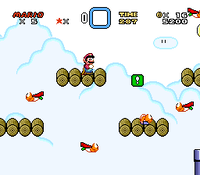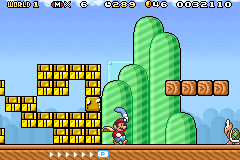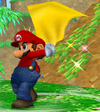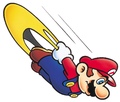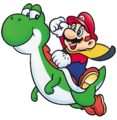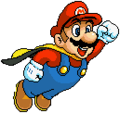Cape Mario
- This article is about the form Mario takes after collecting a Cape Feather. For Baby Mario's invincibility form that has a similar appearance and is also named "Caped Mario", see Superstar Mario.
| Cape Mario | |
|---|---|
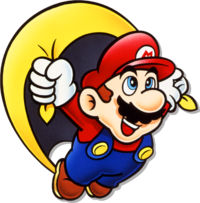 Artwork from Super Mario World | |
| Applies to | Mario, Luigi, Toad, Toadette, Peach, Bowser |
| Item needed | Cape Feather |
| Power(s) given | Glide, fly, spin, Ground Smash |
| First appearance | Super Mario World (1990) |
| Latest appearance | The Super Mario Bros. Movie (2023) |
Cape Mario, originally known as Caped Mario,[1][2] is a form of Mario and Luigi that first appeared in Super Mario World.
History[edit]
Super Mario series[edit]
Super Mario World / Super Mario World: Super Mario Advance 2[edit]
In Super Mario World, the Caped form's abilities are much like those of Raccoon Mario before it, which in fact was originally going to be in the game. The Caped form can be obtained by getting a Cape Feather. The Cape (or Magic Cape)[3] allows Mario (or Luigi) to fly indefinitely through levels and attack enemies by spinning it around (when the player presses or
).
If the player holds down either or
while falling with Caped Mario, the player can float down slowly. Also, if Mario runs at maximum speed and then the player presses and holds
to cape-spin, Mario jumps very high, as if he were flying.
Flight is done by running until Mario spreads out his arms, then jumping while holding ; the initial height depends on how long
was held. Pressing forward on
![]() mid-flight makes Mario descend and speed up, while pressing backward on
mid-flight makes Mario descend and speed up, while pressing backward on ![]() makes him ascend; greater descents generally lead to higher ascents. Mario can also bounce off stomp-able enemies mid-flight. If the player does a fast dive[4] during flight and slams the ground, it causes a ground shake that instantly defeats all onscreen enemies. If Caped Mario glides more gently towards the ground, he can perform a Body Press[4] (also called the Sliding Cape Attack).[5] If Caped Mario touches an enemy while flying, he automatically cape-spins in midair and falls, instead of taking damage. When the player releases
makes him ascend; greater descents generally lead to higher ascents. Mario can also bounce off stomp-able enemies mid-flight. If the player does a fast dive[4] during flight and slams the ground, it causes a ground shake that instantly defeats all onscreen enemies. If Caped Mario glides more gently towards the ground, he can perform a Body Press[4] (also called the Sliding Cape Attack).[5] If Caped Mario touches an enemy while flying, he automatically cape-spins in midair and falls, instead of taking damage. When the player releases and holds
, Mario can stop flying and glide down slowly. After the Cape has attached to Mario's shoes and inflated, he can turn around by spinning mid-flight when the player presses
if
is being used to fly, or vice versa. If Mario climbs a climbable object while flying, he retains the properties of flight.[6]
In the GBA version, Mario can no longer turn around mid-flight, as there is only one run button. Also, Luigi flies higher and more slowly than Mario.
Super Mario Advance 4: Super Mario Bros. 3[edit]
In Super Mario Advance 4: Super Mario Bros. 3, Caped Mario appears as an added form to the game, acting as it does in Super Mario Advance 2; it is the only form that is able to jump while climbing. The form is used primarily in the World-e levels Sea to Sky and Caped Escape. It can also be used anywhere with the appropriate e-Reader card. However, unlike Raccoon or Tanooki Mario's tail whip attacks, Caped Mario's spin attack cannot break Brick Blocks.
Super Mario Maker / Super Mario Maker for Nintendo 3DS[edit]
Cape Mario returns in Super Mario Maker and its Nintendo 3DS port, Super Mario Maker for Nintendo 3DS, under its current name. It appears only in the Super Mario World style, where it functions as it did in Super Mario World: Super Mario Advance 2. Also, knocking on a Warp Door in the Super Mario World style may cause Weird Mario to appear in this form, in one of two possible poses.
Super Mario Maker 2[edit]
Cape Mario returns in Super Mario Maker 2, behaving as it did in its predecessor. Here, Luigi, Toad, and Toadette can also transform into their Cape forms.
Super Mario World television series[edit]
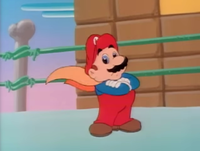
The Caped form appears in the Super Mario World animated series, appearing in several episodes, such as "The Wheel Thing," "Send in the Clown," "King Scoopa Koopa," "The Night Before Cave Christmas," and "Rock TV." Mario is the only character in the show to transform into this form.
Super Mario Adventures[edit]
In the Super Mario Adventures comic, when Princess Toadstool is kidnapped and taken to the Koopaling's Castle, she escapes and finds a cape in Wendy O. Koopa's bedroom. Toadstool falls out the window, still holding the cape, and accidentally uses it. She flies across the moat when Mario flies right past her on a Bullet Bill, making Toadstool lose control and crash in the forest. Toad later uses the cape to fly through the pipe he, Mario, Luigi, and Toadstool originally came from and assemble a rescue team.
Super Mario-kun[edit]
Bowser briefly uses the Caped form in volume 4 of Super Mario-kun. Bowser steals and uses Mario's Cape Feather from the Item Stock, transforming him into Mantle Koopa (マソトクッパ). Bowser attempts to fly and attack Mario, but he fails and crushes him.
Super Mario World 2: Yoshi's Island[edit]
- Main article: Superstar Mario
Superstar Mario, Baby Mario's transformation from Super Mario World 2: Yoshi's Island, looks very similar to Cape Mario.
Super Smash Bros. series[edit]
- Main article: Cape
Mario is able to use the cape power-up in the Super Smash Bros. series with his Cape special move, which reflects projectiles and reverses the direction his opponents face. In Super Smash Bros. for Nintendo 3DS / Wii U, it can be customized to have an electric effect, or to create a gust of wind.
WarioWare series[edit]
Cape Mario appears in two microgames of the WarioWare series: WarioWare: D.I.Y. Showcase's Super Koopa and WarioWare Gold's Super Mario World, both of which involve the goal of having to collect coins.
Super Mario Party[edit]
In Super Mario Party, a sprite of Cape Mario can be seen in Puzzle Hustle.
Mario Kart Tour[edit]
In Mario Kart Tour, Cape Mario makes a cameo appearance on the Cape Mario Hanafuda, which uses the Cape Mario artwork from Mario Hanafuda.
The Super Mario Bros. Movie[edit]

In The Super Mario Bros. Movie, briefly during the Super Mario Bros. Plumbing commercial, Mario and Luigi wear capes while lying prone on top of stools to mimic flying.
Gallery[edit]
- For this subject's image gallery, see Gallery:Cape Mario.
Yoshi's Cookie (SNES)
See also[edit]
Names in other languages[edit]
| Language | Name | Meaning | Notes |
|---|---|---|---|
| Japanese | マントマリオ[?] Manto Mario |
Mantle Mario | |
| Chinese (simplified) | 斗篷马力欧[?] Dǒupeng Mǎlì'ōu |
Mantle Mario | |
| Chinese (traditional) | 斗篷瑪利歐[?] Dǒupeng Mǎlì'ōu |
Mantle Mario | |
| Dutch | Cape-Mario[?] | Cape Mario | |
| French | Mario cape[7] Mario-cape |
Cape Mario | Super Mario Maker |
| German | Cape-Mario[?] | Cape Mario | |
| Italian | Mario con la cappa[?] | Mario with the cape | |
| Portuguese (NOA) | Mario com Capa[8] | Mario with Cape | |
| Mario Capa [9] | Cape Mario | The Super Mario Bros. Movie guidebook | |
| Portuguese (NOE) | Mario Capa[?] | Cape Mario | |
| Russian | Марио с Плащами[?] Mario s Plashami |
Mario with Cape | |
| Марио в плаще[?] Mario v plashche |
Mario in cape | ||
| Spanish (NOA) | Mario con capa[?] | Mario with cape | |
| Spanish (NOE) | Mario con Capa[?] | Mario with Cape |
Trivia[edit]
- In the The Super Mario Bros. Super Show! episode "The Mark of Zero," Mario and Luigi glide with their capes when dressed as Zero and Zero Plus One, respectively, similar to their later caped forms.
- According to an interview with Koichi Hayashida, Cape Mario was considered for Super Mario 3D Land, but Tanooki Mario was eventually chosen.[10]
References[edit]
- ^ 1991. Super Mario World instruction booklet. Nintendo of America (American English). Page 11.
- ^ 2002. Super Mario World: Super Mario Advance 2 instruction booklet. Nintendo of America (American English). Page 22.
- ^ Playing With Super Power: Nintendo Super NES Classics eGuide, Super Mario World Characters Tab.
- ^ a b 1991. Super Mario World instruction booklet. Nintendo of America (American English). Page 16.
- ^ August 1991. Nintendo Mario Mania Player's Guide. Nintendo of America (American English). Page 52.
- ^ November 1, 2020. In Super Mario World, properties of flight are conserved while climbing. If Mario clings to a climbable surface while flying, he will resume flying as soon as he lets go. In addition, he retains the extra hit that flight normally grants, as seen near the end of the footage where he is hit by a Koopa Troopa but does not lose his Cape Mario form. Thus, it is advisable to always start flying before clinging to ropes and fences if possible.. Supper Mario Broth. Archived November 5, 2020, 12:26:01 UTC from the original via Wayback Machine. Retrieved June 5, 2024.
- ^ Super Mario: Manga Adventures. Volume 9, page 16
- ^ Super Mario World Brazilian instruction booklet (PDF). Page 11. Archived July 19, 2021, 09:17:30 UTC from the original via Wayback Machine.
- ^ "Quando você pega uma dessas plumas, o Mario se transforma em Mario Capa, com uma charmosa capa amarela." – Guia do filme do Mario (PDF).
- ^ Buffa, Chris (March 12, 2012). Super Mario 3D Land Interview: Tanooki Suit Beat Cape Mario. Modojo. Archived March 17, 2012, 23:04:30 UTC from the original via Wayback Machine. Retrieved June 5, 2024.
